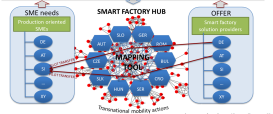|
OBJECTIVE: Identify topics for the pilots with strategic relevance, identify the most effective implementation schemes, making proposals for their harmonization and developing instruments adaptable to region-specific situations.
Two types of pilots will be implemented to validate the model and adopt appropriate enabling instruments at transnational level: specific supply-driven (transfer lab) and demand-driven (policy lab) actions. The TRANSFER LAB will boost the strategic role and the innovative capacity of supply-side players, by enabling cooperation among SMEs and technology providers/knowledge stakeholders along defined strategic topics. The POLICY LAB will improve the innovation governance, enhancing the capacity of administrations to deliver innovation mechanisms, by learning and exchanging ideas for common implementation schemes at regional and transnational level.
The pilot actions will be monitored and qualitatively assessed in terms of sustainability of the innovation approaches, effectiveness and capacity to respond to the needs raised and identified in the RIS3 domain. In order to achieve this, implementation actions will be based on MONITORING TOOL to assess the pilot actions’ outcomes. The methodology will include ex-ante assessment to allow shaping the pilots to each region’s specific circumstances, mid-term assessment to allow monitoring and adjustments of the pilot projects, and ex-post assessment of the specific outcomes. ASSESSMENT OF PILOT PROJECTS will consist of regional impact assessment and transnational impact assessment. At the end, ROAD MAPPING towards an integrated Danube innovation area will be prepared by developing recommendations to policy makers and follow up possibilities. Recommendations will be shared with regional stakeholders and innovation actors.
A set of activities will result in following outputs:
 TRANSFER LAB PILOT: As part of the pilot activity, an interregional voucher scheme will be tested which will encourage interregional transfer of smart factory solutions. The plan is to implement a voucher scheme and to test the transfer of minimum 20 smart factory solution between regions and thus boost the strategic role and the innovative capacity of the proposed system. TRANSFER LAB PILOT: As part of the pilot activity, an interregional voucher scheme will be tested which will encourage interregional transfer of smart factory solutions. The plan is to implement a voucher scheme and to test the transfer of minimum 20 smart factory solution between regions and thus boost the strategic role and the innovative capacity of the proposed system.
Inter-regional transfer of smart factory solutions supported by a voucher scheme:
In the next months we will begin with pilot activities for inter-regional transfer of smart factory solutions. Therefore, an interregional voucher scheme will be established, focused in supporting and enabling the inter-regional transfer of solutions between Smart Factory solution providers and production-oriented SME`s. As a result of this activity, minimum 20 smart factory innovative solution transfers will be supported transregionally. Each project partner will support 2 international/cross-border transfers of solutions. The overall goal is to increase cooperation, unlock resources and skills that are currently inaccessible to SMEs. As a result, a call for the voucher programme will be announced in the next months, which will financially support feasibility studies for applied SME`s.
 POLICY LAB PILOT: Policy Lab pilot will try to improve the governance in the area of innovation, enhancing capacity of administrations to deliver innovation mechanisms by learning & exchanging ideas for common implementation schemes at regional & transnational level. Two objectives will be followed during the implementation: (i) search of RIS3 instruments in 10 regions which could have a potential to secure transfer of innovation/solutions in the domain even after end of project and (ii) to improve existing RIS3 instruments through elaboration of best practice proposals and transfer of good practices at policy level. POLICY LAB PILOT: Policy Lab pilot will try to improve the governance in the area of innovation, enhancing capacity of administrations to deliver innovation mechanisms by learning & exchanging ideas for common implementation schemes at regional & transnational level. Two objectives will be followed during the implementation: (i) search of RIS3 instruments in 10 regions which could have a potential to secure transfer of innovation/solutions in the domain even after end of project and (ii) to improve existing RIS3 instruments through elaboration of best practice proposals and transfer of good practices at policy level.
|
